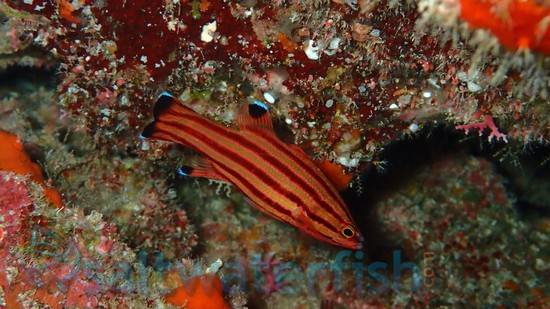Swissguard Basslet – Atlantic – (Liopropoma rubre)
Quick Stats:
- Care Level: Moderate
- Temperament: Semi-aggressive
- Diet: Carnivore
- Reef Safe: Yes
- Minimum Tank Size: 30 gallons
- Maximum Size: 3 inches
- Water Parameters: pH 8.1-8.4, Salinity 1.023-1.025, Temperature 72-78°F
Swissguard Basslet – Atlantic – (Liopropoma rubre):
The Swissguard Basslet, scientifically known as Liopropoma rubre, is a beautiful and colorful saltwater fish species native to the Atlantic Ocean. In this comprehensive guide, we will take a closer look at the various aspects of keeping this species in a saltwater aquarium.
Habitat:
The Swissguard Basslet is found in deep waters, typically around reefs and rocky areas. They prefer areas with plenty of hiding spots and crevices to explore.
Reef Safe:
The Swissguard Basslet is considered reef safe, meaning it is generally compatible with most types of coral and other invertebrates. However, caution should be exercised when introducing it to a reef environment as some individuals may nip at coral polyps or small invertebrates.
Size:
The Swissguard Basslet grows to a maximum size of around 3 inches, making it suitable for smaller to medium-sized aquariums.
Temperament:
This species has a semi-aggressive temperament. While it may be peaceful towards most tankmates, it can become territorial and aggressive towards other similar-sized fish.
Sexual Dimorphism:
Sexual dimorphism is not prominent in the Swissguard Basslet, making it difficult to visually differentiate between males and females.
Lifespan:
The average lifespan of the Swissguard Basslet is approximately 5-8 years, depending on proper care and tank conditions.
Diet in Aquariums:
The Swissguard Basslet is a carnivorous species that primarily feeds on small crustaceans and zooplankton in the wild. In an aquarium, it can be fed a varied diet consisting of high-quality frozen or live foods such as brine shrimp, mysis shrimp, and small marine pellets.
Aquascaping Recommendations:
Providing ample hiding spots and crevices is essential for the Swissguard Basslet. Utilizing live rock formations can create a natural environment that mimics its natural habitat, allowing it to feel secure.
Captive Bred Availability:
The Swissguard Basslet is not commonly available as a captive-bred species. Most individuals found in the aquarium trade are wild-caught.
Compatibility with Tankmates:
The Swissguard Basslet can be kept with other peaceful to semi-aggressive fish species, provided they are not similar-sized or have aggressive tendencies. Some suitable tankmates include:
- Pajama Cardinalfish – Peaceful and adds contrasting coloration to the tank.
- Banggai Cardinalfish – Docile and visually appealing, creating a nice contrast.
- Yellow Clown Goby – Small, peaceful, and adds vibrant coloration.
- Firefish Goby – Peaceful and adds vertical movement to the tank.
- Green Chromis – Schooling fish that adds activity and color to the tank.
Other Common Names:
The Swissguard Basslet may also be known by other common names such as Ruby Basslet or Red Basslet.
Why buy from Reefs4Less.com:
- Wide selection of saltwater fish and corals
- High-quality specimens
- Competitive prices
- Fast and reliable shipping
- Excellent customer service and support
Popular Questions about the Swissguard Basslet:
Q: Can the Swissguard Basslet be kept in a reef tank?
A: Yes, this species is generally considered reef safe, but caution should be exercised as some individuals may nip at coral polyps or small invertebrates.
Q: How big do Swissguard Basslets grow?
A: Swissguard Basslets typically reach a maximum size of around 3 inches.
Q: What is the lifespan of the Swissguard Basslet?
A: With proper care, this species can live for approximately 5-8 years.
Q: What should I feed my Swissguard Basslet in an aquarium?
A: A varied diet consisting of high-quality frozen or live foods such as brine shrimp, mysis shrimp, and small marine pellets is recommended.
Q: Are Swissguard Basslets aggressive towards other fish?
A: While they can be territorial, they are generally peaceful towards most tankmates. However, aggression may occur towards other similar-sized fish.
| Size | < 2 inches |
|---|


Reviews
There are no reviews yet.